Garage rock is a raw and energetic style of rock music that flourished in the mid-1960s, most notably in the United States and Canada, and has experienced a series of subsequent revivals. The style is characterized by basic chord structures played on electric guitars and other instruments, sometimes distorted through a fuzzbox, as well as often unsophisticated and occasionally aggressive lyrics and delivery. Its name derives from the perception that groups were often made up of young amateurs who rehearsed in the family garage, although many were professional.
LHI Records was an American record label founded by Lee Hazlewood. LHI stood for Lee Hazlewood Industries. The label was first distributed by Decca Records then by ABC Records. By 1969, LHI was distributed independently with tape distribution by Ampex. The label lasted until 1971.

Barton Lee Hazlewood was an American country and pop singer, songwriter, and record producer, most widely known for his work with guitarist Duane Eddy during the late 1950s and singer Nancy Sinatra in the 1960s and 1970s. His collaborations with Sinatra as well as his solo output in the late 1960s and early 1970s have been praised as an essential contribution to a sound often described as "cowboy psychedelia" or "saccharine underground". Rolling Stone ranked Lee Hazlewood & Nancy Sinatra No. 9 on its list of the 20 Greatest Duos of All Time.
The International Submarine Band (ISB) was a country-rock band formed by Gram Parsons in 1965, while a theology (?) student at Harvard University and John Nuese, a guitar player for local rock group, The Trolls. Nuese is credited with having persuaded Parsons to pursue the country-rock sound for which he would later be remembered. Parsons' work with the band predates his better known ventures with The Byrds, the Flying Burrito Brothers, and the Fallen Angels with Emmylou Harris.

James Ervan "Jim" Parker is an American singer-songwriter and co-founder of the Huntsville, Alabama sub-chapter of the Nashville Songwriters Association International. Parker lives in Madison, Alabama, his home since 1985.

Honey Ltd. were an American 1960s girl group consisting of sisters Alexandra and Joan Sliwin, Laura Polkinghorne and Marsha Temmer.

The Painted Faces were an American garage and psychedelic rock band from Fort Myers, Florida, who were active from 1967 through 1969, and were not only popular in Florida but achieved a following outside of their own region by playing regular shows in New York City and elsewhere. After disbanding they became practically unknown for a number of years. But since the 1980s, with the reissue their songs on various compilations, they have come to the attention of garage rock and psychedelic devotees. They are known for songs such as "Anxious Color", which Mojo magazine named one of the top 100 psychedelic songs of all time.
The Humane Society were an American garage rock band from Simi Valley, California who were active from 1965 through 1968, who are best known for their 1967 protopunk anthem, "Knock Knock."
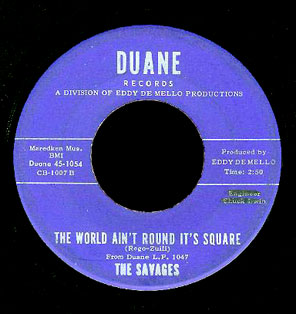
"The World Ain't Round It's Square" is a song recorded in 1966 by The Savages, a garage rock band from Bermuda and was written by Howie Rego and Bobby Zuill. It was recorded live at the Hub, a nightclub at the Princess Hotel in Bermuda and appeared on their live album taped from the event, Live 'n Wild. The song has been mentioned as a landmark anthem of 1960s youthful defiance and is ranked #4 in the list of the 1000 greatest garage rock records in Mike Markesich's Teenbeat Mayhem. It has been featured on the Teenage Shutdown! The World Ain't Round, It's Square! compilation as well as included the reissue of Live 'n Wild.
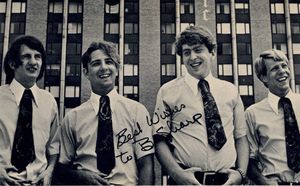
T.C. Atlantic was an American garage rock/psychedelic rock band from Minneapolis, Minnesota who were active in the 1960s. They were one of the most popular groups in the Twin Cities, but failed to break nationally. In the intervening years since their breakup, their recordings have attracted the interest of '60s music collectors and enthusiasts, and they are particularly remembered for their 1966 fuzz-tinged song, "Faces", which has been mentioned as one of the earliest garage rock songs to display psychedelic characteristics.

Sir Winston and the Commons were an American garage rock band formed in Indianapolis, Indiana, in 1963. The group released two highly regarded singles, which, upon release, earned the band a regional following, and resulted in reinterest in their music over the years. At the height of their popularity, Sir Winston and the Commons were regulars at the teen dance club the Cellar, in Chicago.
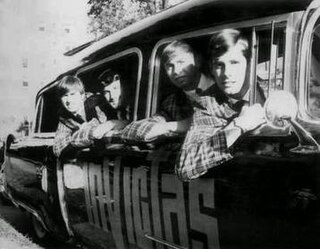
The Invictas are an American garage rock band from Rochester, New York who were active in the 1960s, but re-formed in 2004 and have been intermittently active since. They were one of the most popular local bands in the Rochester scene during the 1960s, scoring a regional hit with "The Hump" in 1965.

The Plagues were an American garage rock band from Lansing, Michigan who were active in the 1960s. They were led by bass player, principal songwriter, and vocalist William Malone. The group had a local and regional hit with "I've Been Through It Before". Malone left the band in 1966 to join the Frightened Trees, as the remaining members formed a new group out of the ashes of the Plagues, the Plain Brown Wrapper. Malone later became a successful Hollywood movie director, whose 2008 horror thriller Parasomnia included "I've Been Through It Before", as well as other songs by the Plagues and other 1960s garage bands. In the intervening years the Plagues work has attracted a following amongst garage rock enthusiasts and collectors.
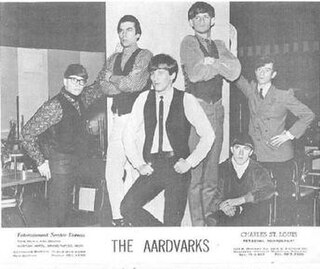
The Aardvarks were an American garage rock band from Muskegon, Michigan who were active between 1964-1968. They recorded three singles, two of which were issued on labels of Dave Kalmback's Fenton Records based in Sparta, Michigan. The group scored a local hit with "I'm Higher than I'm Down", which is now considered a garage rock classic, and several of their songs have been included in garage rock compilations.

The Escapades were an American garage rock band from Memphis, Tennessee who were active in the 1960s. They became one of the most popular groups in the Memphis area during the mid-1960s and recorded two singles. "I Tell No Lies", the A-side of their debut single, became a big hit in Memphis and around the South. They were signed to Verve Records, who released their follow-up, "Mad, Mad, Mad", which featured a fuzz-toned guitar line. Their work is highly regarded by garage rock enthusiasts and collectors and has appeared on various compilations.
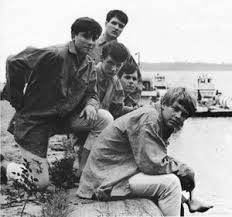
Lawson and Four More were an American garage rock/psychedelic rock band from Memphis, Tennessee, who were active in the 1960s. The group was led by Bobby Lawson and was known for their hard, blues-based sound which, as they evolved, increasingly incorporated esoteric psychedelic elements. The group regularly worked with musician, songwriter, and producer Jim Dickinson and cut the first rock release for Memphis label, Ardent Records. As a side-project, they briefly recorded under the name The Avengers, as a Batman-themed takeoff group in 1966.

The Oxford Circle was an American garage rock and psychedelic rock band from Davis, California, near Sacramento, who were active from 1964 to 1967. They became a popular garage rock act with a proto-punk sound influenced by Them and other blues-based bands of the British Invasion, that, in addition to heavy guitar feedback, came to encompass psychedelia. The group began to make appearances in San Francisco, where they became a top draw in venues such as the Avalon Ballroom. They taped a show at the Avalon in 1966 and, after lying in the vaults for years, it was rereleased in 1997 on the Nuggets from California: Live at the Avalon 1966 anthology. In 1967, they released the single, "Foolish Woman" b/w "Mind Destruction", which is also included, along with several other studio outtakes, on the Nuggets from California compilation. In 1967, drummer Paul Whaley left to play in pioneering heavy rock act Blue Cheer. Lead vocalist and guitarist Gary Lee Yoder and lead guitarist Dehner Patten left to form Kak, who recorded for Epic Records. Yoder subsequently went on to join Blue Cheer in one of their later configurations.
The Movin' Morfomen were an American garage rock and psychedelic band from Espanola, New Mexico, who active in the 1960s. They became one of the most popular acts in New Mexico and had several local and regional hits. They are well-regarded by garage rock and psychedelic enthusiasts, and their collected works appear on the Flashbacks! anthology, issued in 1997.
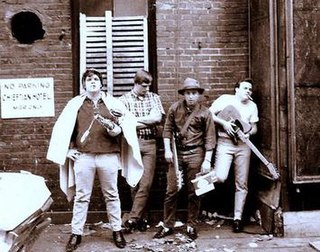
The Brymers were an American garage rock band from San Joaquin Valley, California, who were active in the 1960s. They had a regional hit with the song "Sacrifice", which also received distribution overseas and managed to garnish airplay in parts of Europe, New Zealand, and Australia. Although they only released one single, they recorded numerous unissued tracks that would subsequently be released on CD between 2007 and 2008. The group reunited in 2007 and have since been active on stage and in the studio, releasing five CDs containing old and new material. "Sacrifice" and their version of "The House of the Rising Sun" were both featured in the film Jobs starring Ashton Kutcher. Their song "I Want to Tell You" was included in a scene from the ABC TV series Once Upon A Time.
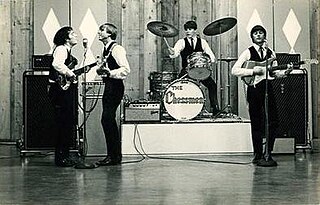
The Chessmen were an American garage rock band from Denton, Texas, near Dallas, who were active in the 1960s. They were one of the most popular bands in the region and recorded for Bismark Records, where they recorded three singles including, "I Need You There", which is now considered a garage rock classic. The band is notable for including several members who went on to greater fame. Jimmie Vaughan, brother of Stevie Ray Vaughan was briefly a member, joining after the death of original band leader, guitarist, and vocalist, Robert Patton, who died in a boating accident in 1966. Drummer Doyle Bramhall later played with and wrote songs for Stevie Ray Vaughan, and Bill Etheridge later played bass with ZZ Top. Following the breakup of the Chessmen, several of their members, including Jimmie Vaughan, went on to form a group that would come to be known as Texas Storm, which eventually included Stevie Ray Vaughan on bass.















